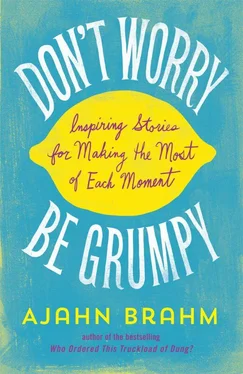“Only a GP? I am a brain surgeon,” said the guest, raising his nose. “Being a GP is hardly brain surgery!”
“I too am a doctor,” said the host’s wife. “I work for Medecins Sans Frontieres and have just returned from six months treating injured children in a war-torn region of the Middle East. It was extremely dangerous work, but someone has to help those poor kids.”
“It must be difficult doing charity work,” replied the self-important guest, holding his nose even higher, “but you must admit, it is hardly as difficult as being a brain surgeon!”
“I am a doctor as well,” interrupted the host’s son. “I have a PhD in physics, and I work for NASA building rockets. You must admit, Doctor, brain surgery is hardly rocket science!”
Then the well-dressed guest’s nose fell down, together with his self-satisfaction.
If you find joy thinking that you are better than someone else, then you will find suffering in equal proportions when you meet someone better than you. It is better not to compare yourself at all.
When you have a healthy sense of self-worth, then you don’t need to play the “I am better than you” game. You don’t need to prove yourself. A healthy sense of self-worth comes from realizing the true meaning of being perfect.
A woman walked in a forest looking for a perfect tree. All she saw were crooked trees, trees with missing branches, and trees with damaged bark. Then she went into a government-managed plantation, where she saw all the trees perfectly arranged in rows and lines, perfectly straight, with all the branches perfectly in place.
She realized that the damaged trees in the natural forest were far more beautiful and calming than the “perfect” trees in the artificial plantation. Then she also understood that so-called damaged people are so much more beautiful than artificial people.
She began to feel at home with herself, as much as she felt at home in the natural forest with all the gnarled and crooked trees.
She understood the real meaning of perfection. She had been for a long time “good enough.” Only in the forest did she realize it.
Monks like to spend their time meditating rather than answering the phone. Some people assume that monks have nothing else to do all day than man — I mean “monk”—the phone, answering every caller’s problems about marriage and mental health or about giving blessings. I call this the “Dial-a-Monk Service.”
So we recorded a new voicemail message at our monastery:
“If you want to hear a recorded blessing chant for good luck, press 1.
“If you want to speak to one of the monks, you are out of luck, so press 1 anyway!”
Now we can meditate in peace.
You Have the Right Not to Be Happy
In today’s world, if you are not happy, then some assume that there must be something very wrong with you. You need therapy. You may be encouraged to visit a happiness clinic. Some companies even have a “chief happiness officer” to rid their staff of the perceived problem. Happiness is the must-have commodity of the modern age. Soon there will be fines for those who dishearten others by being unhappy in public and jail terms for those serial offenders who are persistently miserable!
Recently, when I was teaching a retreat in beautiful surroundings with very delicious food, a young woman confessed to me that she felt grumpy for no reason.
“I know I should not be unhappy, because I am upsetting everyone else, but I can’t help it. I just feel miserable,” admitted the girl, guiltily.
So I went to my office and quickly composed and printed out the following “grumpy license”:
GRUMPY LICENSE
This document officially grants to the bearer
a perpetual right to be grumpy,
for any reason or no reason at all,
without let or hindrance.
Let no one infringe this right.
Signed, Ajahn Brahm
When I handed her the license to be grumpy, she started laughing.
“You are missing the point!” I protested.
I have also had to print out many happiness licenses. We have to get a license to drive a car, get married, own a dog, and many other things in the modern world — why can’t we obtain a license to be happy?
There are many people who think that they do not deserve to be happy. Perhaps they have done some terrible thing in the past for which they cannot forgive themselves. Or maybe they have suffered abuse from another and have lost their sense of self-worth.
At a retreat that I was teaching in Germany, a young man was having trouble meditating. He told me that he was also experiencing many other problems in his life. He couldn’t hold down a steady relationship. His career was going nowhere. And he felt that he was living in an endless winter of gloom. Whenever any opportunity for happiness came along, he would habitually chase it away. He subconsciously believed that he did not deserve to be happy. There are many people like him.
I did notice that he had a great respect for me. His friends told me that he regarded me as his all-knowing, all-loving, spiritual master! That was rather excessive, but an advantage nevertheless. I gave him a happiness license, signed by someone he considered infallible. Me!
He respected that license so much that he took it seriously. He framed it and put it on his wall. It was a constant reminder that he had been permitted by someone in authority to be happy. Consequently, he stopped rejecting moments of joy and allowed himself to be happy. Many of his difficulties, including in meditation, vanished.
The only trouble was that he told a friend who posted a copy of my happiness license on Facebook. I was soon inundated with so many requests for signed happiness licenses that I lost my own happiness for a while, having no time to meditate!
So I’ve put an official happiness license at the back of this book. You can insert your name, cut it out, and put it in your wallet if you want to keep with you a reminder to let yourself be happy. I’ve given each one my seal of approval!
A few years ago, I was flown all the way from Australia to England to deliver a keynote speech at a prestigious human resources conference in London’s Docklands. The fully sponsored trip also meant that I could visit family and friends in the UK.
Fifteen minutes before I was to go up to the podium for the one-hour presentation, one of the organizers told me that there were two people at the entrance to the convention center claiming to be my relatives and trying to get in for free. I went with the manager to check and, sure enough, it was my brother and his daughter. After a minute of sweet-talking, which I am very accomplished at, I convinced the event coordinator to let them in for no charge.
After my session, I scolded my brother and niece for embarrassing me.
“You are a bank manager, brother! And you have a good job too, niece! Why didn’t you just pay the fee?”
Then they told me that the fee was three hundred pounds each just to listen to me for sixty minutes.
My annoyance disappeared when I learned how much I was worth. It was replaced by a huge boost in self-esteem.
When I returned home to Australia, I told the committee of my temple about the newly discovered “market rate” for attending one of my talks. They replied diplomatically that I was worth far more than three hundred pounds per hour per person. “You are priceless,” the committee proposed, seconded, and unanimously agreed upon. That means they still don’t charge anyone to attend any of my talks.
Читать дальше










